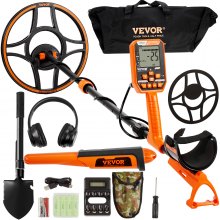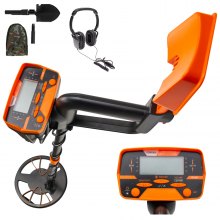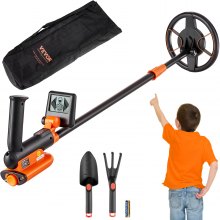Explore VEVOR’s Metal Detectors in Threat Detection and Public Safety
This age has safety and security as a top concern. Therefore, innovative solutions keep arising to keep people secure and prevent problems. As such, metal detectors are one of the common soldiers of safety.
From residential institutions to high-security buildings, securing the places and people remains a high priority. With most weapons made of metals, detecting and preventing unauthorized metal have greatly curbed insecurities.
Metal detectors of different types have helped secure people and buildings and foil nefarious plans. As such, VEVOR stays committed to people’s security with our advanced metal-detecting systems.
Benefits Of Metal Detectors
Metal detectors do more than keep out weapons. They also have other benefits, including helping to detect things that may otherwise stay hidden.
Many places are using metal detectors for various purposes. These include:
Efficient Screening Process
Metal detectors facilitate thorough searches in high-traffic areas, enabling quick, non-invasive searches of individuals and their property.
This simplified method reduces waiting times, improves crowd management, and improves efficiency in areas such as transit centers and convention centers
Early Warning Systems
Metal detectors frequently include real-time alarm systems that alert users when metallic dangers are detected.
These alerts prompt security staff to take rapid action, such as completing additional inspections or activating emergency measures, preventing potential security breaches, and mitigating the effect of unfavorable occurrences.
Public Confidence and Trust
Metal detection systems in public areas build public confidence and trust and assure their safety and well-being.
By demonstrating a commitment to proactive safety measures, organizations, and authorities for them and their communities, residents develop positive relationships and contribute to a community climate of reassurance and resilience.
Different Types Of Metal Detectors
Metal detectors are classified into several varieties, each focusing on a certain use or environment. These sorts can be roughly classified according to their technology, design, and intended use.
Beat Frequency Oscillation (BFO) Metal Detectors
BFO detectors are one of the simplest and most cost-effective metal detectors. It uses two wires—a transmitter coil and a receiver coil—connected to an oscillator circuit. When a metal object interferes with the magnetic field between the coils, the frequency of the oscillator changes, indicating the presence of metal.
BFO detectors are often used for amateur purposes, such as coin mining and monument hunting, due to their ease of use and low cost.
Very Low Frequency (VLF) Metal Detectors
VLF detectors are the most popular metal detector types in use today. They work by sending an electric current to the ground and detecting changes in frequency caused by metal objects.
VLF detectors can distinguish between metals based on conductivity and adjust sensitivity levels to filter out unwanted signals. These detectors are versatile and suitable for various applications, including coin mining, relic detection, and gold mining.
Pulse Induction (PI) Metal Detectors
PI detectors use current pulses to generate magnetic fields and detect changes in these fields caused by metal objects.
Unlike VLF detectors, PI detectors transmit and receive tremendous energy, allowing them to penetrate deep into the ground and detect large metal objects.
PI detectors are less sensitive to mineral soils and can work well in highly permeable environments, making them ideal for offshore and underwater metal detection.
However, they generally lack discriminatory power and can generate more spurious signals than VLF detectors.
Walk-Through Metal Detectors
These detectors are commonly used for security testing at the entrances of buildings, airports, stadiums, and other high-traffic areas. They have multiple detection points and emit electricity to detect metal objects on a person’s body.
Walk-in metal detectors are essential for security personnel to quickly and accurately screen individuals for possession of weapons and contraband.
Metal Detecting Legalities and Regulations
Metal detecting, while a fascinating pastime and important tool in sectors like archeology and treasure seeking, is governed by laws and regulations to guarantee appropriate and ethical use of the technology.
These restrictions differ greatly depending on the nation, area, and individual locations. The following are some common legal issues and restrictions related to metal detecting.
Land Ownership and Permission:
One of the most important legal issues for metal detecting is land ownership and authorization. Metal detecting on private property without the landowner's consent is typically unlawful and can lead to trespassing penalties.
Cultural Heritage Protection
Many nations have rules and regulations to safeguard cultural heritage sites from illegal metal detection and artifact removal.
Metal detecting without legal authorization in archeological sites or places of historical interest is frequently restricted to protect artifacts and preserve significant historical treasures.
Protected Areas and National Parks
Metal detecting is usually forbidden or limited in protected areas such as national parks, wildlife reserves, and conservation zones to maintain natural ecosystems and minimize wildlife disturbance.
Regulations may differ. Therefore, consult with local authorities before detecting in such areas.
Why Choose VEVOR Metal Detectors?
The accessibility of VEVOR’s metal detectors in several countries worldwide makes it one of the favorite choices. Besides the fact that you can easily buy them in your hardware stores and online, VEVOR has maintained its credibility for years, making it a brand of choice.
Committed to exceptional customer support, we offer comprehensive support to ensure customer satisfaction and product performance. VEVOR’s metal detectors are also easy to use and maintain. With VEVOR being your cost-effective solution, our metal detector is your best bet in ensuring security.
FAQs About Metal Detectors
How do metal detectors work?
Metal detectors function by creating an electromagnetic field and then detecting changes in that field produced by metallic items. When a metal object interrupts the electromagnetic field, it generates an electrical signal in the detector coil, which is subsequently analyzed to determine the metal's existence and position.
Can metal detectors detect all types of metals?
Metal detectors may detect various metals, including ferrous (iron-based), non-ferrous (such as gold, silver, and aluminum), and alloys. The detecting capabilities of a metal detector might vary based on the kind and settings.
How deep can metal detectors detect objects?
The depth at which a metal detector can detect items is determined by various factors, including the kind of metal detector, the object's size and composition, soil conditions, and environmental influences. Metal detectors can detect items up to several feet deep.


























































































